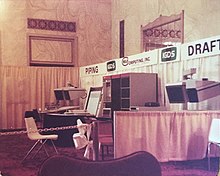Intergraph
Logo used from 2004 to 2010 | |
| Company type | Subsidiary |
|---|---|
| Industry | Software, Geographic Information Systems[1] |
| Founded | 1969 |
| Headquarters | Huntsville, Alabama, United States |
Key people | Ola Rollén, CEO Mattias Stenberg, President, Hexagon Asset Lifecycle Intelligence (ALI) Steven Cost, President, Hexagon Safety & Infrastructure Mladen Stojic, President, Hexagon Geospatial |
| Revenue | |
Number of employees | 4,000 |
| Parent | Hexagon AB |
| Website | hexagonppm |
Intergraph Corporation was an American software development and services company, which now forms part of Hexagon AB. It provides enterprise engineering and geospatially powered software to businesses, governments, and organizations around the world, and operates through three divisions: Hexagon Asset Lifecycle Intelligence (ALI, formerly PPM), Hexagon Safety & Infrastructure, and Hexagon Geospatial. The company's headquarters is in Huntsville, Alabama, United States.[2]
In 2008, Intergraph was one of the one hundred largest software companies in the world.[3] In July 2010, Intergraph was acquired by Hexagon AB.
History
[edit]

Intergraph was founded in 1969 as M&S Computing, Inc., by former IBM engineers Jim Meadlock, his wife Nancy, Terry Schansman (the S of M&S), Keith Schonrock, and Robert Thurber who had been working with NASA and the U.S. Army in developing systems that would apply digital computing to real time missile guidance. The company was later renamed to Intergraph Corporation in 1980.[4]
One of Intergraph's major hardware projects was developing a line of workstations using the Clipper architecture created by Fairchild Semiconductor. Intergraph was one of only two companies to use the chips in a major product line. Intergraph developed their own version of UNIX for the architecture, which they called CLIX. In 1987, Intergraph bought the Fairchild division responsible for the chip.
In 1997, Intergraph began pursuing patent infringement litigation against Intel and other computer hardware manufacturers based on the intellectual property developed in Clipper. Intergraph negotiated major settlements with Intel,[5] HP,[6] Texas Instruments[7] and Gateway,[8] earning the company over $394M. In 2000, Intergraph exited the hardware business and became purely a software company. On July 21, 2000, it sold its Intense3D graphics accelerator division to 3Dlabs, and its workstation and server division to Silicon Graphics.[9]
On November 29, 2006, Intergraph was acquired by an investor group led by Hellman & Friedman LLC, Texas Pacific Group and JMI Equity, making the company privately held. On October 28, 2010, Intergraph was acquired by Hexagon AB.[10] The transaction marks the return of Intergraph as part of a publicly traded company.
As part of the Hexagon acquisition, Hexagon moved the management of ERDAS, Inc. from under Leica Geosystems to Intergraph, and Z/I Imaging airborne imaging sensors from under Intergraph to Leica Geosystems.[11]
On December 2, 2013, the geospatial technology portfolio was split out from under the Intergraph Security, Government and Infrastructure division to form the Hexagon Geospatial division.[12] On October 13, 2015, the Intergraph Security, Government & Infrastructure division was rebranded as Hexagon Safety & Infrastructure.[13] On January 9, 2017, the Intergraph Government Solutions division was rebranded as Hexagon US Federal.[14]
On June 5, 2017, the Intergraph Process, Power & Marine division was rebranded as Hexagon PPM.[15]
On June 6, 2022, the Hexagon PPM division was rebranded as Hexagon Asset Lifecycle Intelligence.[16]
References
[edit]- ^ "Intergraph Corporation company Profile". Dun & Bradstreet.
- ^ Niccolai, James (January 21, 2005). "HP pays $141M to settle Intergraph lawsuit". Computerworld. Retrieved February 1, 2024.
- ^ "The World's Largest Software Companies". Software Top 100. Archived from the original on June 29, 2017. Retrieved February 9, 2009.
- ^ Weisberg, David (2008). "The Engineering Design Revolution: The People, Companies and Computer Systems That Changed Forever the Practice of Engineering" (PDF). Chapter 14. Archived (PDF) from the original on March 4, 2016. Retrieved June 26, 2016.
- ^ Kawamoto, Dawn (March 30, 2004). "Intel settles Intergraph suit for $225 million". cnet.com. Retrieved June 14, 2019.
- ^ Niccolai, James (January 21, 2005). "HP pays $141M to settle Intergraph lawsuit". computerworld.com. Retrieved June 14, 2019.
- ^ "Intergraph Announces Settlement With Texas Instruments". businesswire.com. September 10, 2003. Archived from the original on August 2, 2020. Retrieved June 14, 2019.
- ^ Spooner, John J (May 13, 2004). "Intergraph, Gateway settle Pentium patent suit". ZDNet. Retrieved June 14, 2019.
- ^ "SEC quarterly result mentioning the sales of graphic accelerator and computer activities". Secinfo.com. Retrieved October 5, 2012.
- ^ "Hexagon AB - Press release". Cision Wire. Archived from the original on July 29, 2012. Retrieved October 25, 2010.
- ^ "Intergraph and ERDAS: From GeoMedia to IMAGINE-The Big and Little Picture for this Geospatial Marriage". Archived from the original on February 1, 2013. Retrieved March 11, 2013.
- ^ "Hexagon Announces Changes within Technology Division and New Appointments to Group Management". Archived from the original on January 19, 2014. Retrieved December 2, 2013.
- ^ "Intergraph SG&I Becomes Hexagon Safety & Infrastructure". Retrieved October 13, 2015.
- ^ "Intergraph Government Solutions Announces Corporate Name Change to Hexagon US Federal". Retrieved January 9, 2017.
- ^ "Hexagon PPM is the New Brand for Intergraph® Process, Power & Marine". Retrieved June 5, 2017.
- ^ "Hexagon's Asset Lifecycle Intelligence division announces new name to better reflect expanded solutions portfolio". hexagonppm.com. Retrieved July 26, 2022.
External links
[edit]- 1969 establishments in Alabama
- 2010 disestablishments in Alabama
- 2010 mergers and acquisitions
- American companies established in 1969
- American companies disestablished in 2010
- Companies based in Huntsville, Alabama
- Computer companies established in 1969
- Computer companies disestablished in 2010
- Defunct computer companies of the United States
- Defunct computer hardware companies
- Defunct software companies of the United States
- GIS software companies
- Software companies based in Alabama
- Software companies established in 1969
- Software companies disestablished in 2010
